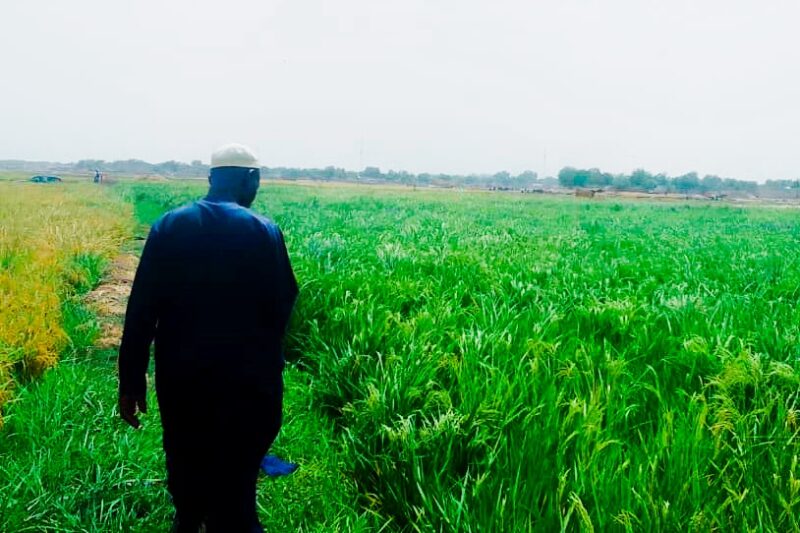Analyst says Borno State government has failed to provide adequate security so it is up to farmers to find ways to protect themselves from attacks by insurgents, which appear to be on the rise.
The Borno State government has failed to protect farmers so it is up to them to establish self-defence mechanisms to protect themselves against attacks by insurgents.
So says Shettima Mamman, a security analyst and the head of the department of criminology and security studies at the Mohammed Goni College of Legal and Islamic Studies in Maiduguri, the state capital.
He has urged farmers to “embrace courage and perseverance” and to work together to protect their lives and property.
Although it is the state government’s responsibility to protect farmers, Mamman says it has failed to do so.
“Farmers need to work together and to form stronger ties with security personnel, including local hunters, vigilantes and members of the civilian joint task force [CJTF], to protect themselves, their families and their property,” he said.
“Everyone knows it is the responsibility of the government to provide adequate security, including more operatives, to safeguard farmers on their farmlands.
“But it has somehow failed. And this means it is up to the farmers to establish self-defence mechanisms to protect themselves.
“The might of insurgents is strong. They have weapons, some extremely sophisticated, and they attack in large numbers.
“It’s difficult for farmers to protect themselves when all they have at their disposal are sticks, cutlasses and knives. When they are on their farmlands, they are isolated. There is no way they can defend themselves.
“Farmers need to be more security conscious and vigilant. They need to liaise with all security operatives in their district, including the military, agro rangers, CJTF members and local vigilantes and hunters. If they intend going into the forest and bushes, they must arrange security escorts.
“They must not rely on the government solely to prove security. They need to collaborate with one another, form groups when they go to their farmlands and collaborate with all security operatives.
“Until the government can promise their safety, they need to exercise extreme caution. They must be on the lookout at all times.”
Mamman said farmers were in an extremely challenging situation – they needed to produce food not only for themselves and their families but also for the country.
“Each day they have to decide whether to go hungry or to take a chance and go to their lands. For most farmers it is not a choice. They have to go to their lands. They pray to Allah that they will be safe.”
Although relative peace has returned to parts of the state, farmers told RNI that they feared going to their lands because the number of attacks by insurgents was on the rise.
They said many farmers had been forced to flee their lands.
In May at least eight farmers in the Damboa and Kaga districts were killed by heavily armed insurgents while they were clearing and preparing their lands for the rainy season.
Farmers said they were frequently attacked by members of the Jamā’at Ahl as-Sunnah lid-Da’way Wa’l-Jihād (JAS), more commonly referred to as Boko Haram, or its even more vicious splinter group, the Islamic State West Africa Province (ISWAP).
“It is difficult to tell them apart because they do not wear uniforms. They look the same,” said Ba Modu Chingori, a farmer from the Dikwa Local Government Area.
He said many farmers had already fled from their districts for safer grounds in the neighbouring local government areas of Biu and Shani.
But hunger and the extreme cost-of-living crisis has forced most farmers to go to their lands despite their fear of being attacked.
“Security is still a major issue. But we are starving. We have to go to our farms to work the land. Our families are starving and, in the present cost-of-living crisis, most people cannot afford even the basics.
Chingori said the rain had already started and farmers were ready to start seasonal farming.
“But we feel insecure. We want to farm and we need food to feed our families and to sell at markets to make money. But we are constantly on the lookout for insurgents. Every day we go out to our lands we are afraid that it might be our last day.
“Living in terror is no way to live. Sometimes it makes you feel hopeless.”
Mohammed Tijjani, a farmer from Damboa, told RNI that many farmers in rural communities had fled to Askira-Uba for safety.
“I had already cleared my farmland and was ready for this year’s seasonal farming. Then Boko Haram stopped us from farming. They told us to leave and threatened to kill us if we didn’t. They told us not to return. That’s when I and some other farmers decided to flee from our hometown. I went to Askira-Uba. Others went to Shani or Biu.”
Gajimi Ali, from the Damboa district, said farmers did not know what to do about the increasing number of attacks by insurgents.
“Boko Haram insurgents know that farmers are on their lands now because it is the wet season. Just about every time we go to our lands insurgents confront us. They chase us away and tell us not to return.
“We are really concerned about our safety and security. The insurgents are heavily armed and there are many of them. Each day we fear they will attack us. We are scared that we will be killed or wounded. When we see Boko Haram we run back home.
“You cannot go even as far as 2km on the outskirts of Damboa town before you come across insurgents. It’s a major problem. If Boko Haram does not kill us, famine will.”
SHETTIMA LAWAN MONGUNO








